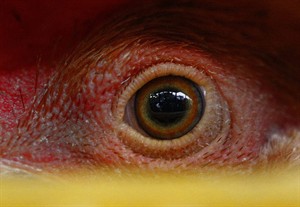
Scientists describe 1st human infection with strain of bird flu, call for more surveillance
LONDON – A strain of bird flu that scientists thought could not infect people has shown up in a Taiwanese woman, a nasty surprise that shows scientists must do more to spot worrisome flu strains before they ignite a global outbreak, doctors say.
On a more hopeful front, a company on Wednesday reported encouraging results from its first human tests of a possible vaccine against a different type of bird flu that has been spreading through Asia since first appearing in China last spring that is feared to have pandemic potential.
The woman, 20, was hospitalized in May with a lung infection. After being treated with Tamiflu and antibiotics, she was released. One of her throat swabs was sent to the Taiwan Centres for Disease Control. Experts there identified it as the H6N1 bird flu, widely circulating in chickens on the island.
The patient, who was not identified, worked in a deli and had no known connection to live birds. Investigators couldn’t figure out how she was infected. But they noted several of her close family and friends also developed flu-like symptoms after spending time with her, though none tested positive for H6N1. The research was published online Thursday in the journal Lancet Respiratory Medicine.
Since the H5N1 bird flu strain first broke out in southern China in 1996, public health officials have been nervously monitoring its progress — it has so far killed more than 600 people, mostly in Asia. Several other bird flu strains, including H7N9, which was first identified in China in April, have also caused concern but none has so far mutated into a form able to spread easily among people.
“The question again is what would it take for these viruses to evolve into a pandemic strain?” wrote Marion Koopmans, a virologist at the National Institute for Public Health and the Environment in the Netherlands, in a commentary accompanying the new report.
She said it was worrying that scientists had no early warning signals that such new bird flus could be a problem until humans fell ill. Scientists often monitor birds to see which viruses are killing them, in an attempt to guess which flu strains might be troublesome for humans — but neither H6N1 nor H7N9 make birds very sick.
Koopmans called for increased surveillance of animal flu viruses and more research into predicting which viruses might cause a global crisis.
“We can surely do better than to have human beings as sentinels,” she wrote.
The vaccine news is on the H7N9 bird flu that has infected at least 137 people and killed at least 45 since last spring. Scientists from Novavax Inc., a Gaithersburg, Md., company, say tests on 284 people suggest that after two shots of the vaccine, most made antibodies at a level that usually confers protection.
“They gave a third of the usual dose and yet had antibodies in over 80 per cent,” said an expert not connected with the work, Dr. Greg Poland of the Mayo Clinic. “This is encouraging news. We’ve struggled to make vaccines quickly enough against novel viruses,” he said.
Results were published online by the New England Journal of Medicine.
___
AP Chief Medical Writer Marilynn Marchione contributed to this report from Milwaukee.
____
Online:
www.lancet.com
Join the Conversation!
Want to share your thoughts, add context, or connect with others in your community? Create a free account to comment on stories, ask questions, and join meaningful discussions on our new site.

















Leave a Reply
You must be logged in to post a comment.